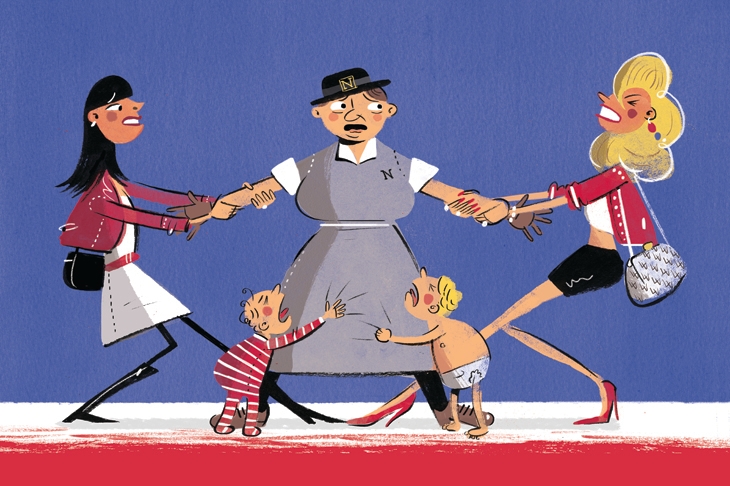There is an au pair drought in the UK. Since the 2016 Referendum there has been a 75 per cent drop in applications by foreign girls to work for UK families. Agencies testify that they can’t find girls for their clients, who must turn to other forms of childcare beyond the rare girl keen to ‘learn English’, grandparents, if they can be dragged out of restaurants, and baby-sitting apps like Bambino, Bubble and UrbanSitter.
There is a campaign to #SaveAuPairs. Its web page is illustrated with a cartoon featuring a ginger child screaming for its au pair and Theresa May washing up plates, which makes me wonder if this campaign is more ambivalent about working women than it says.
What will mothers — I mean parents — do when au pairs are so scarce parents feel they have to take any nutter, or give up work themselves?
I am grateful my husband took charge of our son’s early years. It wasn’t easy for him: people — usually NHS professionals — constantly asked where I was. I am grateful that my son is now at school, because the search for childcare is riven with fear and guilt.
No option is ideal except perhaps Jacob Rees-Mogg’s but very few people inherit a nanny outside Jilly Cooper novels — and even there it didn’t work out well. If you are rich you might have a Norland nanny, who is much better at childcare than you are, and yet is willing to be dressed in the most sexless costume in the history of clothing — the ultimate husband repellent.
If poorer — the 100,000 or so UK families who employ au pairs, mostly in the south-east — you pay about £15 a day plus bed and board for what #SaveAuPairs calls, disingenuously in my view, a ‘cultural exchange’ that is ‘neither work nor holiday’. If it isn’t a holiday, it’s work. Au pairs are vulnerable — young, and often lonely. Would you respect someone you paid £15 a day? There are stories of au pairs forced to work longer than the usual 25 hours a week, and of being locked in the house. Misery runs both ways. A friend’s au pair arrived, cried for a week and returned home.
You need to trust, based on almost nothing. My favourite carers were young women who pretended my son was their baby. Others might read that as a prelude to kidnapping but I was comforted. It meant they wouldn’t harm him. I also liked the ones who said I was a bad mother — I was told off for serving frozen vegetables — for the same reason.
This is unprofessional, you may cry, and you are right. You are asking for something that cannot really be monetised — love — and professional qualifications are, well, they are professional qualifications. I have met teenagers I would gladly leave my son with, and the headmaster of a prep school I would not leave him with for even a moment.
The carers are likewise vulnerable. Our maternity nurse slept on an uncomfortable futon because I had not told my husband to buy her a bed, and she did not complain. She obviously thought she could not, and I am still ashamed of that.
Sometimes the worst happens. This week a London couple were jailed for murdering their 21-year-old au pair. In New York City a nanny murdered two of her charges. You might go to fairy tales to find cases equally chilling: to the young girl’s step-mother who seeks to kill her, for jealousy; to the woman in the gingerbread cottage with promises of soft beds and food for the lost children in the woods. Fairy tales are evidence of past crimes. If we need to tell stories to process fears, they are reasonable fears.
But there is another option now: childcare delivered to your door by the gig economy. I have tried this, with mixed results. One brought him home much later than agreed without explanation. Another left him screaming in his cot. Had I got what I deserved or am I, as my husband says, internalising my own misogyny? Some excellent people aside, no one really seems to care about childcare in Britain, and a bad situation has got worse. The Spectator ran a piece about this once. It counselled against employing a fat nanny. That may be good advice, but it is hardly a definitive solution for parents. I mean mothers.







Comments